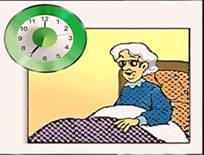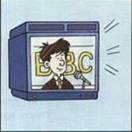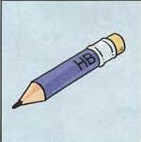Teaching and learning Goals:
1.能争取使用下列词汇(Curriculum words):good, morning, hi, hello, afternoon, evening, how, are, you, I, am, fine, thanks, OK.
2.能争取使用下列常用短语(Useful expressions)
Hello! Hi! Good morning! Good afternoon! Good evening!
How are you? I am fine. I’m OK. Thanks.
3.能认读下列词汇(non-curriculum words): HB, CD, BBC, Alice, Bob, Cindy, Dale, Frank, Grace, Helen.
Teaching and learning steps:
Step 1: Learn to read the words
T: I am your English teacher, this term we will learn English together. Now look around, can your see any English letters or words?
S: Yes.
T: We can see English everywhere. English is very interesting and useful.
(设计意图:让学生环顾四周寻找英文字母或单词,引导其发现英语是随处可见而且是非常有用的,从而引导学生步入快乐的英语世界,并激发学生学习英语的兴趣。)
1. 1. Open the books at Page 94. Students try to read the words using the phonetics by themselves,mark the difficult words that they can’t pronounce correctly or clearly .
(设计意图:让学生学会试读单词是一种学习习惯的培养,首先学生自己根据音标字读单词,并标出试读时有困难的。)
2. Read the difficult words in groups so that they can help each other. They should pay more attention to the pronunciation and the intonation. The teacher should give them a hand if necessary.
(设计意图:在小组内互读交流发言,相互纠正发音,以小组为单位解决遇到的困难。培养他们合作学习及解决问题的能力。)
3. Get one or two middle-level students to read all the words. Ask the good students to correct the wrong pronunciations. If necessary, the teacher corrects them.
4. Read after the tape.
5. Read the words aloud by themselves, and the teacher walks around to see if they need some help.
(设计意图:采取分组学习兵教兵的方式,充分发挥这一部分学生的积极性来带动全体学生的学习英语的积极性。用这种先自学再合作交流的方式才能促使学生大胆张嘴,大声朗读。学生学会识读单词是一种自学能力和习惯的培养,提高全体学生积极性。鼓励没过关的学生课前课后努力赶上。)
Step 2 Learn to remember words
1. Remember the words by looking at pictures.

morning n. 早晨
We do exercises in the morning.

afternoon n. 下午
We should have a rest in the afternoon.

evening n. 晚上
We go to sleep in the evening.

hello/hi
We say hello or hi to our friends.
(设计意图:让学生据图片猜测生词,让学生直观地理解单词的意思,通过建立语境和语义之间的关系,促进理解、加深记忆,培养学生用英语思维的习惯。减少了学生对汉语的依赖,避免孤立地理解和记忆单词。)
2. T: Now let’s meet some new friends.



Alice Bob Cindy



Dale Eric Frank


Grace Helen
3. Guess the abbreviations.
T : Do you know what the letters mean?



HB CD BBC
4. Get the students to read the words by the rules of pronunciation.
a /æ/ am Alice thanks Frank
/ei/ Dale Grace
e /e/ Eric Helen
结尾不发音 are fine Alice Dale Grace
i / i / Alice Cindy Eric
/ai/ hi I fine
o /ɔ / Bob
/əu/ hello
oo / u:/ afternoon
/u/ good
(设计意图:让学生通过元音字母及字母组合的读音规则来拼读记忆新单词)
5. Remember the phrases by matching itself with its meaning.
Hello! 嗨!
Hi! 你好!
Good morning! 你好吗?
Good afternoon! 早上好!
Good evening! 谢谢。
How are you? 下午好!
I am fine/OK. 晚上好!
Thanks. 我很好。
(设计意图:让学生根据其意思连线,以此给学生提供根据英语释义记忆单词的能力.)
6 .Competition: A guessing game.
Divide the students into two groups ,show some pictures and let the students guess who they are.
Students say their names as quickly as they can.
(设计意图:挑战记忆王 分组竞赛,调动学生的积极性,让他们根据图片的闪现快速回想起图片中孩子的英文名字,看哪组最迅速准确,锻炼学生的迅速反应能力。)
7. Remember the words by their Chinese .
1.怎样;如何 _______ 2.是____ ____ 3.你;你们_________
4.我_______ 5.健康的;美好的______ 6.好;可以 _______
Step 3: Consolidation of words
1. Ask the students to read the words and phrases and their Chinese. Cover the English words and phrases , look at the Chinese and say the English for them. Write down the words they haven’t grasped.
(设计意图:先自我检查,找出仍未达标的单词,然后仍然采取小组互助的形式,需要利用自习课或课余的时间让小组长跟踪检查,尽量能让全部学生顺利过关。)
2. The students write down the words with the Chinese given in guide books. Underline the words they haven’t grasped. If they can’t, dictate after class in groups.
(设计意图:学生利用各种感官巩固单词。通过音素分类、抢答或使用助学默写等各种形式对单词加以巩固。教师应及时督促,让小组长反馈检查结果,尽量能让全部学生顺利过关。)
Step 4 Sing the song and translate it into Chinese.
1. Ask the students to sing the song, and underline the new words.
2. Translate the song into Chinese in groups of three.
3.Sing the song fluently by themselves.
Good morning!
Good morning!
How are you?
I’m fine, thanks.
How are you?
I’m OK.
Good afternoon, Alice!
Good afternoon, Cindy!
How are you, Grace?
I’m fine, thanks.
How are you, Helen?
I’m OK.
Good evening, Bob!
Good evening, Dale!
How are you, Eric?
I’m fine, thanks.
How are you, Frank?
I’m OK.
早晨好!
早晨好!
你好吗?
我很好,谢谢!
你好吗?
还不错。
下午好,艾莉丝!
下午好,辛迪!
你好吗,格蕾丝?
我很好,谢谢!
你好吗,海伦?
还不错。
晚上好,鲍勃!
晚上好,丹尼尔!
你好吗,埃里克?
我很好,谢谢!
你好吗,弗兰克?
还不错。
(设计意图:用“两只老虎”的音乐改编这首歌曲,让学生在歌曲中理解和体会单词的含义,从而加深对单词的理解和记忆。)
Step 5 Mind map
Students try to finish the mind-map according to what they have learned this class.

(设计意图:把本课词汇以思维树的形式呈现出来,有利于帮助学生对词汇从逻辑范畴上进一步巩固记忆。)
Step6. Role play
Make some name cards. Take turns to be Alice Bob Cindy Dale Eric Frank Grace and Helen. Make conversations using the information from the song according to the mind-map.
For example:
—— Good morning, Bob!
—— Good morning, Cindy! How are you?
—— I’m fine. Thanks. How are you?
—— I’m OK.
(设计意图:呈现真实情境,在真实情境巩固单词的记忆,在真实情境中运用单词,给每位同学以说的机会,同时也能调动学生学习的积极性。)
Step7. The end-of class test
I.请按照字母顺序排列下列人名。
Alice Dale Helen Bob Eric Cindy Grace Frank
______________________________________________________
II.根据首字母提示和句意完成句子。
1. H______ are you, Cindy?
2.I’m f______, t________.
3. –H_____, Dale!
--Hi, Grace!
4. Good e________, Bob and Frank!
III. 汉译英。
1. 早上好! ____________
2. 下午好! ____________
3. 晚上好! ____________
4. 你好吗? ____________
5. 我很好。 ____________
6. 我还不错。 ____________
7. 谢谢! ____________
课堂自评:
The things I did |
Evaluation |
I played an active role in this class |
5 4 3 2 1 |
I expressed myself in English very well |
5 4 3 2 1 |
I followed my teacher well and took some necessary notes |
5 4 3 2 1 |
I worked together with my partners very well. |
5 4 3 2 1 |
I made some progress in this class |
5 4 3 2 1 |
TOTAL SCORES |
|
20-25: Excellent 15-19:Very good 10-14:Good 5-9: Just so so 1-4: Need to improve |
Step8.Homework:
You must: 制作本单元单词卡片。(正面英语,反面汉语)
If you can: 搜集更多缩略词。
亮点: 1.本课利用图片和歌曲在语境中学习单词,有利于学生整体感知。通过让学生根据音标试读新单词,既复习了音标又锻炼了学生的自主学习的能力。
2.本课注重了学生自学和小组合作能力的培养,同时通过各种训练形式,既加深了单词的识记,又巩固了单词的用法,取得事半功倍的效果,同时也让学生养成一种良好的学习习惯。
不足之处:本课是在刚学完音标的基础上进行的,对于单词的拼读,有少部分学生还不太熟练,需要老师多加指导。
使用建议:Mind-map 的设计是针对整堂课内容的设计,而并不是针对歌曲而设计的,目的在于让学生对整个单元结构更加明了清晰。
答案:
I.请按照字母顺序排列下列人名。
Alice Bob Cindy Dale Eric Frank Grace Helen
II.根据首字母提示和句意完成句子。
1. How 2.fine, thanks 3.Hello/Hi 4.evening
III. 汉译英。
1. Good morning! 2. Good afternoon! 3. Good evening!
4. How are you? 5. I’m fine. 6. I’m OK. 7. Thanks.

